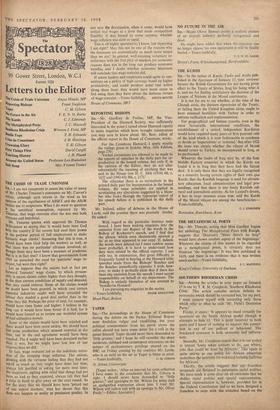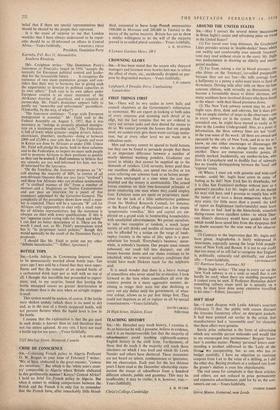SOUTHERN RHODESIAN CRISIS
SIR,—Among the articles in your paper on January 17 is one by T. R. M. Creighton, 'Southern RhOdesian Crisis.' This article contains certain definite in- accuracies which should be corrected but, for my part, I must content myself with correcting only those which refer to what he calls 'Mr. Field's Dominion Party.'
Firstly, it states : 'It appears to stand virtually for apartheid on the South African model (though it attempts to hide it).' This is quite incorrect in both parts and I know of nothing to support this conten- tion in any of our policies or behaviour. The bracketed comment is both unworthy and unfortu- nate.
Secondly, Mr. Creighton asserts that it is our policy to import 'lowly white artisans to do, qua whites, jobs that .could be done by Africans' This again is' quite untrue as our policy for African education underlines the necessity for technical training faCilities for Africans.
Thirdly, the article suggests that our franchise proposals are designed to perpetuate racial politics. We have made it quite clear on all occasions that we dislike racial politics and special representation. Special representation is, hdwever, provided for in the Federal Constitution and so we have designed a franchise to cope with this situation based on the belief that if there are special representatives they should be elected by the people they represent.
It is the cause of surprise to me that London weeklies that I have always understood to be reput- able should be so ill-informed on affairs in Central President, Dominion Party Karimha, P.O. fox 51, Marandellas, Southern Rhodesia
[Mr. Creighton writes : 'The Dominion Party's Statement of Principles issued in 1956 "accepts the necessity for European political control and leader- ship for the foreseeable future. . . . It recognises the existence of two main population groups and con- siders that their way to harmony lies in giving each the opportunity to develop its political capacities in its own sphere." Each race in its own sphere under European control is an exact statement of the Afrikaner doctrine of apartheid, and a rejection of partnership. Mr. Field's disclaimer appears fully to justify my "unworthy and unfortunate" parenthesis. (Unworthy, by the way, of what?) 'The Statement continues : "Large scale European immigration is essential." Mr. Field said in the Federal Assembly on August 5, 1957, that it was necessary to "indulge in properly planned immigra- tion on a maximum possible scale." The Federation is full of lowly white artisans—engine drivers, bakers, electricians, plumbers, mechanics—doing at between £800 and £2,000 a year jobs that in Uganda and even in Kenya are done by Africans at under £300. Unless Mr. Field will pledge his party, both in these columns and in the Federation, to import no more such people and to promote Africans to their positions as quickly as they can be Stained, I shall continue to believe that my .remarks are too well-informed for him, not too ill-informed for the Spectator.
'On the franchise, the Statement proposes an "A" roll electing the majority of MPs, to consist of all non-Africans (because they are ipso facto "civilised") and those few Africans who can produce testimonials of "a civilised manner of life" from a number of electors and a Magistrate or Native Commissioner and can pass an interview by a panel of five examiners appointed by the Governor-General. The complexity of the procedure shows how small a num- ber ts expected. There will be a separate "B" roll for Africans only (apparently to elect only a small num- ber of African representatives, but the statement is obscure on this) with lower qualifications. If this is not "separate racial voting rolls for black and white"
I can find no better description of it. These are the words I used, not, as Mr. Field's unconscious mind has it, "to perpetuate racial policies," though this would naturally be the result of the Dominion Party's proposals.
'I should like Mr. Field to point out my other "definite inaccuracies." '—Editor, Spectator.]































 Previous page
Previous page